|
There's
more than mere mathematical symmetry in having 56 year olds write
about how their lives have changed in independent India's 56th year
of existence. Anyone born in 1947 would have spent their first 44
years in a socialist economy and the next 12, arguably, the best
years of their lives, in a country moving towards becoming a free
market economy. There's no question that the life of the typical
56 year old has changed in ways he or she couldn't have visualised
in the late 1980s. There's the banker who was so taken in by the
power of computing that she opted for voluntary retirement and is
training to be a computer science instructor. There's the entrepreneur
who saw his market vanish post-liberalisation. There's the farmer
who believes things could be better. And there's the soap-loving
housewife who likes the profusion of channels but not how people
seem to have become self-centred. Remember, all this has happened
in the past 12 years.
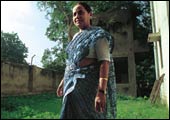 Swathanthra
Krishnan 56 Swathanthra
Krishnan 56
Retiree and instructor-in-training, Ahmedabad
Krishnan
owes her name to the fact that she was born on august 15, 1947.
And she owes her current vocation-she is on her way to becoming
a trained software programmer and instructor-to another Independence
Day, this one in 1991 when India started its tentative march towards
becoming a free market economy. For 29 years of her life, between
1972 and 2001, Krishnan worked in a bank; she opted for voluntary
retirement in 2001, when she was the assistant manager of the Breach
Candy, Mumbai branch of Indian Overseas Bank. "I had not thought
of a life after the bank before 1990, but then, things changed,"
says Krishnan. Computerisation blew her mind and she decided that
"I had to be part of the world of computers". A decade
later ("You cannot decide to retire overnight"), Krishnan
took advantage of a Voluntary Retirement Scheme launched by her
bank and quit. Then came a basic course in computing from C-DAC,
a programming one from NIIT, and a diploma in computer science from
the Indira Gandhi National Open University. Now based in Ahmedabad
her aim is to "teach post-graduate students eventually".
 Mari
Gowda 56 Mari
Gowda 56
Farmer, Mandya, Karnataka
Farmers don't have
weekends. On this Sunday in early August, Gowda is busy de-weeding
his five acres of land. Still, he isn't complaining. The past 12
years have brought him his share of good: a reinforced concrete
roof over his head, electricity, a Bajaj scooter (bought second
hand), and a black and white television set. A co-operative buys
the milk produced by the three cows Gowda owns; he operates an account
at the local credit co-operative; and a land records computerisation
drive has made it possible for him to obtain records at a near-by
kiosk. "All this has made life easier," admits Gowda.
Rising prices and the quality of power supply offset these to some
extent says the farmer who believes events of the past decade have
made people "more money-minded". "Today, no one serves
milk because the co-operative buys it at Rs 9 a litre and they'd
rather sell it." Gowda is happy his grandchildren go to school
where they learn English and how to use the computer. "I hope
they make a life in the city."
 Swatantra
Radhakrishnan 56 Swatantra
Radhakrishnan 56
Government Employee, New Delhi
Radhakrishnan remembers
growing up in Delhi in the 1950s and 1960s. She was the third child
in a brood of seven, and like most families of the time, hers believed
in austerity. "We weren't rich, but then, we didn't want much
either," says Radhakrishnan. Hers was the radio generation
that grew up listening to Ramanathan Krishnan's semi-final loss
to Rod Laver in Wimbledon '61 and M.S. Subbulakshmi's performance
at the un General Assembly in 1966. The generation has taken to
the new India like a fish to water. "I watch every Tamil soap
on television," says Radhakrishnan, an officer at New Delhi
Press Information Bureau. And everything-a car, telephone, refrigerator-has
"become a necessity". The 1971 batch Central Information
Services officer likes the way things have turned out. It's less
expensive to call her sister in the US now. And while her daughters
didn't take up medicine or accounting like she wanted them to, they
are doing well in their chosen profession, journalism. After retirement,
Radhakrishnan plans to venture out on her own, maybe "corporate
media relations", or "running a nursery school".
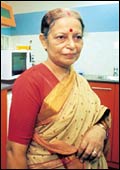 Anita
Chatterjee 56 Anita
Chatterjee 56
Homemaker, Kolkata
Over the past decade,
Chatterjee has succumbed to the creature comforts promised by a
clutch of household- and kitchen-appliances. "They really do
away with the drudgery of housework and I am no longer at the mercy
of the maid," she says, listing soaps-on-satellite-channels,
ATMs, falling telephone tariffs, and, of course, appliances as the
best part of the past 12 years. Expenses "that have increased
100 per cent over 10 years", and the fact that theirs is no
longer the close-knit community it used to be takes away some of
that. The Chatterjees spend most of their time in their modest two-storey
house in South Kolkata, surrounded by sepia-tinted photographs of
the past.
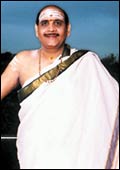 R.
Jayaraman Iyer 56 R.
Jayaraman Iyer 56
Senior Executive, Mumbai
At his age, and
in his position, executive director, IDBI, Iyer should be in cruise-mode.
Instead, says the man, he has to "keep reinventing" himself
to do well in a knowledge-intensive job, something that's as true
for organisations as it is for individuals. "Competition has
ensured that just innovation won't get you ahead," says Iyer.
"Today, you need to think out of the box." He's also working
faster (and out of the office as well, courtesy a portable computer
and a mobile phone). When he graduated from engineering school,
Iyer thought he had arrived, an idea he confesses he doesn't subscribe
to anymore. "Today, a person with a basic qualification like
an engineering degree finds himself under-qualified for a certain
job and over-qualified for another," says Iyer. The banker
still retains some old-world notions, especially when it comes to
the credit culture. And the fact that one is able to buy more material
things now, he argues, is offset by the fact that most people have
little time for the important (but non-material) things in life.
 M.
Sambasivam 56 M.
Sambasivam 56
Shop Floor worker, Chennai
Have the past 12
years changed Sambasivam's life? Well, to the extent that they have
changed the fortunes of the company he works for, Sundram Fasteners.
A preferred global vendor to General Motors (its exports story began
in the early 1990s), the company is also renowned for its progressive
labour policies, something Sambasivam, a packer at its Padi, Chennai
factory can vouch for. Today, one of his daughters works for Airtel
and is working towards an MBA; the other is halfway through engineering
school. The company offered both merit-based scholarships. Out of
his savings, Sambasivam has also managed to buy a small piece of
land on which he plans to build a house after he retires. Not bad
going for a man with no college education who earns just over Rs
10,000 a month.
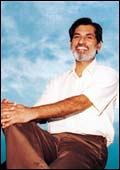 Kuriakose
Mamkoottam 56 Kuriakose
Mamkoottam 56
Professor, New Delhi
June 1991, and
Mamkoottam is at his parent's house in Kottayam, Kerala, when he
reads a newspaper report about the then Finance Minister Manmohan
Singh's new economic policy. Today, 12 years later, the man is Director,
Faculty of Management Studies, having in the same period, seen his
salary more than double, acquired a flashy small car, and benefited
from the University's munificence regarding foreign jaunts. Thanks
to the past decade, it is now alright for the young to consider
career options that go beyond the usual suspects such as medicine,
accounting, and engineering. Mamkoottam's 20-year old son, for instance,
has taken to art and design, a career in which, the professor admits
"would have been considered ridiculous even in the late 1980s".
Poor quality and corruption are issues that worry Mamkootam but
he is hopeful. "We shall overcome," he says.
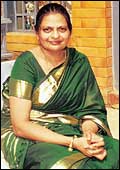 Rajam
Rajaram 56 Rajam
Rajaram 56
Social Worker, Chennai
India's reforms
programme hasn't just meant economic benefits for a cross-section
of the populace. The past 12 years have made individuals and corporates
more socially aware. Increasingly, representatives from both constituencies
are involved in activities that seek to make the world a better
place for everyone. In 1990, Rajam Rajaram, then a 43-year old widow
at a loose end and possessed of an abiding interest in social work
joined Exnora International, an organisation founded by a former
banker, M.B. Nirmal, who quit his job to, literally, clean up the
city. While most people have spent the past 12 years furthering
their careers and enriching their coffers, Rajaram has plodded on,
spreading the message of cleanliness, spearheading civic projects,
some funded by corporates, or just planting trees. "There is
so much to be done," she says.
V.B. Shanker 56
Entrepreneur, Hyderabad
 Valadi
Balasubramaniam Shanker may smile now, but there was a time in the
late 1990s when his future looked grim. In 1970, Shanker founded
Athreya Engineering, a carbide-tipped tools manufacturer. His business
model was sound: carbide tools are required for a clutch of machining
operations; public sector companies presented a huge market opportunity;
and Hyderabad, where the likes of bhel, HMT, Praga, BDL, and Allwyn
had factories was the place to be. Liberalisation changed all that:
several public sector companies faced the brunt of the reforms process,
some of them shut down lines, even entire plants, and Athreya's
revenues dipped to a mere Rs 15 lakh in 2000, from around Rs 45
lakh in 1998. Today, courtesy its focus on partnerships and customers,
the company's revenues are a healthy Rs 30 lakh and Shanker, as
President of the Federation of Andhra Pradesh Small Industries Association
is helping small enterprises become competitive enough to benefit
from the global sourcing agendas of multinationals in the automotive,
defense, and aerospace sectors (an agenda about which he is passionate),
a task he believes he is cut out for. The die-hard entrepreneur
is also working out the details of a component manufacturing joint
venture targeted at some of these sectors. The investment? A respectable
Rs 20 crore. "I have learnt that it is important for us to
produce for the mass market and pooling our resources is one way
forward," says Shanker. Important lesson that, and he learnt
it post 1991. Valadi
Balasubramaniam Shanker may smile now, but there was a time in the
late 1990s when his future looked grim. In 1970, Shanker founded
Athreya Engineering, a carbide-tipped tools manufacturer. His business
model was sound: carbide tools are required for a clutch of machining
operations; public sector companies presented a huge market opportunity;
and Hyderabad, where the likes of bhel, HMT, Praga, BDL, and Allwyn
had factories was the place to be. Liberalisation changed all that:
several public sector companies faced the brunt of the reforms process,
some of them shut down lines, even entire plants, and Athreya's
revenues dipped to a mere Rs 15 lakh in 2000, from around Rs 45
lakh in 1998. Today, courtesy its focus on partnerships and customers,
the company's revenues are a healthy Rs 30 lakh and Shanker, as
President of the Federation of Andhra Pradesh Small Industries Association
is helping small enterprises become competitive enough to benefit
from the global sourcing agendas of multinationals in the automotive,
defense, and aerospace sectors (an agenda about which he is passionate),
a task he believes he is cut out for. The die-hard entrepreneur
is also working out the details of a component manufacturing joint
venture targeted at some of these sectors. The investment? A respectable
Rs 20 crore. "I have learnt that it is important for us to
produce for the mass market and pooling our resources is one way
forward," says Shanker. Important lesson that, and he learnt
it post 1991.
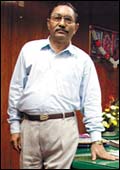 B.N.
Rattan 56 B.N.
Rattan 56
Banker, Mumbai
Next month, when
Shakshi Sharma joins a bank in Mumbai, she would be following a
hoary family tradition. Her father B. N. Rattan is a banker and
so was his father. Except there's one big difference this time around.
A management graduate, Shakshi has given public sector banking,
where her father has made a career over the last 35 years, a wide
berth. Is the dad feeling hurt? Maybe just a little, but in many
ways it's also a symbolic coming-to-a-head of changes that Rattan
himself has lived through the last 10 years. "A private sector
bank obviously provides a better service structure and more amenities
than a public sector bank," says Rattan, who joined Allahabad
Bank as a clerk rose to be its Deputy General Manager. But that's
not how the native of Ludhiana always saw things. At one point in
his career, Rattan- his original ambition was to be a lecturer until
his father nixed it-was a union activist, shouting slogans and protesting
against change. Then, private sector competition came and banking
changed forever. "Earlier people used to literally worship
bank managers, but now we worship the customer," admits Rattan.
No doubt that's the first thing his daughter will be told when she
joins the private bank next month.
-compiled by Shailesh Dobhal,
Moinak Mitra, Abir Pal, Shilpa Nayak, E. Kumar Sharma, Nitya Varadarajan,
Venkatesha Babu and Dipayan Baishya
|
